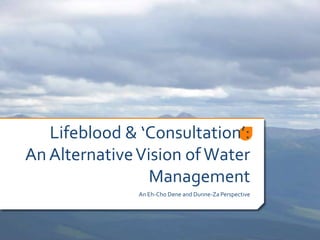
Lifeblood Consultation: An Alternative Vision of Water Management
- 1. Lifeblood & ‘Consultation’: An Alternative Vision of Water Management An Eh-Cho Dene and Dunne-Za Perspective
- 2. Mihimihi: Ko Turtle Island te waka Ko Klin Se Za te maunga Ko Peace, Muskwa, Liard te awa Ko Eh-Cho Dene and Dunne-Za te Iwi Ko Sharleen Wildeman and Roland Wilson te rangatira Ko whenua te marae Ko Caleb Zabdi Behn ahau
- 4. Outline: My Thesis Water Management as ‘Reconciliation’ Te Awa Tupua Klin Se Za (Twin Sisters) Legal Evolution of Colonization Theories of legal empowerment Next Steps for Keepers Of The Water 4
- 5. Thesis: Water is the lifeblood. Water can sustain both living and non-living entities. “Reconciliation” is not being achieved. Klin Se Za (Twin Sisters) Water’s great power is that it is both the source of life and the pathway to life. 5
- 9. Significance of Te Awa Tupua? Symbolic: Kaitiaki Mana Reconciliation under Te Tiriti (Treaty of Waitangi) Practical: Legal ‘standing’ for the River. Legal Evolution. Adaptive Management.
- 10. Colonial/Early Suppression Era Anger/Recognition Reconciliation Era National Era (1860's-1950's) Era (1950's-1980's) (1990s-Present) (Contact-1860's) •A 'Century of Twilight' •Fight for Recognition •Co-management •Political Trust •Extermination •Maori Renaissance •Waitangi Tribunal/OTS •Nation-to-Nation •Assimilation •S. 35 Canadian •Modern Treaties Treaties Constitution Legal Evolution of Indigenous/Settler Relations Steady movement towards “Reconciliation” as a principle: Consistent erosion of the land/water resources:
- 11. What is “Reconciliation”? “…the central concern of ”…a pragmatic attempt reconciliation was with at the settlment of providing non- historic grievances to combative means by thereby improve the which recognized ‘certainty of property entities might engage arrangements’ and with and live alongside establish ‘consensual settler-society more formal relationships’ harmoniously…” legitimating the settler P.G. McHugh Aboriginal Societies and the Common Law, A History of States.” Sovereignty, Status and Self-determination (OUP, Oxford, 2004) at 608. Kirsty Gover Tribal Constitutionalism: States, Tribes, and the Governance of Membership (OUP, Oxford, 2010) 159.
- 12. What could ‘Reconciliation’ be? Legal evolution for powerless groups: 1. Id. a need for change 2. Create a new ethical imperative 3. New ethic+new interest groups=political pressure 4. Progressive theorists counter status-quo arguments 5. Strategic litigation+economic/political pressure=new laws 6. Pushback from those impacted 7. Reformers go international
- 13. Aboriginal Water Rights/Responsibilities? Water Rights 1. Moderate living 2. Remain in traditional communities 3. Preserve indigenous culture. ‘Reasonably Incidental’ Rights to Water Title to Water Implied Rights to Water Winters Doctrine Treaty Rights to Water Inherent Water Right for Self Government 1. Innate 2. Necessary to implement other rights Right to adequate levels of Environmental Protection
- 14. Critical next steps: Articulate a new ethic Public Health surrounding water ‘Reconciliation’ UNDRIP/Human Rights Engage a larger audience Direct Action Energy-Water Nexus Reconciliation-Water Solidarity with other Nexus? Indigenous Peoples Create new ideas Maori Return on Energy and Mexico Water Invested Legal Personhood for Water Non-legal Advocacy: (balance with corporate http://vimeo.com/349 personhood?) 38207
- 15. Questions/Actions for Discussion: 1. Identify areas of legal 1. Make a plan that aligns vulnerability in major the Keepers of the Water: developments. Legal Activism/test case litigation 2. Identify opportunities for Academia introducing a ‘new ethic’ Direct Action on water. Education 3. Identify new language to Economic Development connect the issues: First Nations 1. ‘Canada’s Carbon Governments Corridor’ Others!
- 16. Mussi Cho! http://www.devlingailus.com/litigation/Westernboundary/Map_Treaty_8_1900.JPG
Notas do Editor
- Turtle Island carries me.My mountain is Klin Se ZaThe Peace, Muskwa and Liard are my Rivers.My Nations are the Eh-Cho Dene and Dunne-ZaSharleenWildeman and Roland Wilson are my Chiefs.The Land is my home I am Caleb ZabdiBehn
- Water is the lifeblood. Without the lifeblood there is no life.Water does not merely sustain physical entities. It sustains non-physical processes and relationships as well.The Courts have consistently stated that “reconciliation” is the goal of aboriginal jurisprudence. THEREFORE:Reconciliation can be created and sustained via the process of recognizing and implementing a shared vision of water management. It is through the process of shared ware management that the best things in our federalist system are brought to light. We are Treaty 8 nations. We agreed to share with the Crown in the spirit of peace and friendship. As a result our relationship originally existed premised on the notion of sharing and mutual ability…This relationship has steadily been eroded by ongoing impacts and issues…. All of these issues relate to water in some way. Water’s great power is that it is both the source of life and the pathway to life. Therefore if we can integrate and improve the status of water within our system we are going towards real reconciliation.
- Anderson, referencing political economy theories points out that the pattern by which the powerless gain legal recognition and protection follows a ‘remarkably consistent path’ and the stages of reform are:The need for protection of the powerless group arises when conditions begin to significantly deteriorate due to the economic pressures of market industrialization. Pressure for reform grows as a new ethical/moral imperative develops.This new ethical imperative must be coupled with the formation of an adequate interest group structure to achieve effective political pressure.Progressive theorists assist this interest group structure in its engagement with the dominant paradigm by articulating language and philosophy to counter free-market based arguments.Changes in the economic equation and impact litigation add pressure to the calls for reform. Critical at this point is the use of the economic forces that will benefit from the reform legislation to assist with the interest group structure that has been pushing for reform.Reformers must deal with the backlash from negatively impacted economic interests threatened by change. (weakening legislation, inadequate enforcement etc.)Reformers must also be prepared to engage at an international level as foreign competition and the exporting of problems continues.Ibid. 8-9.
